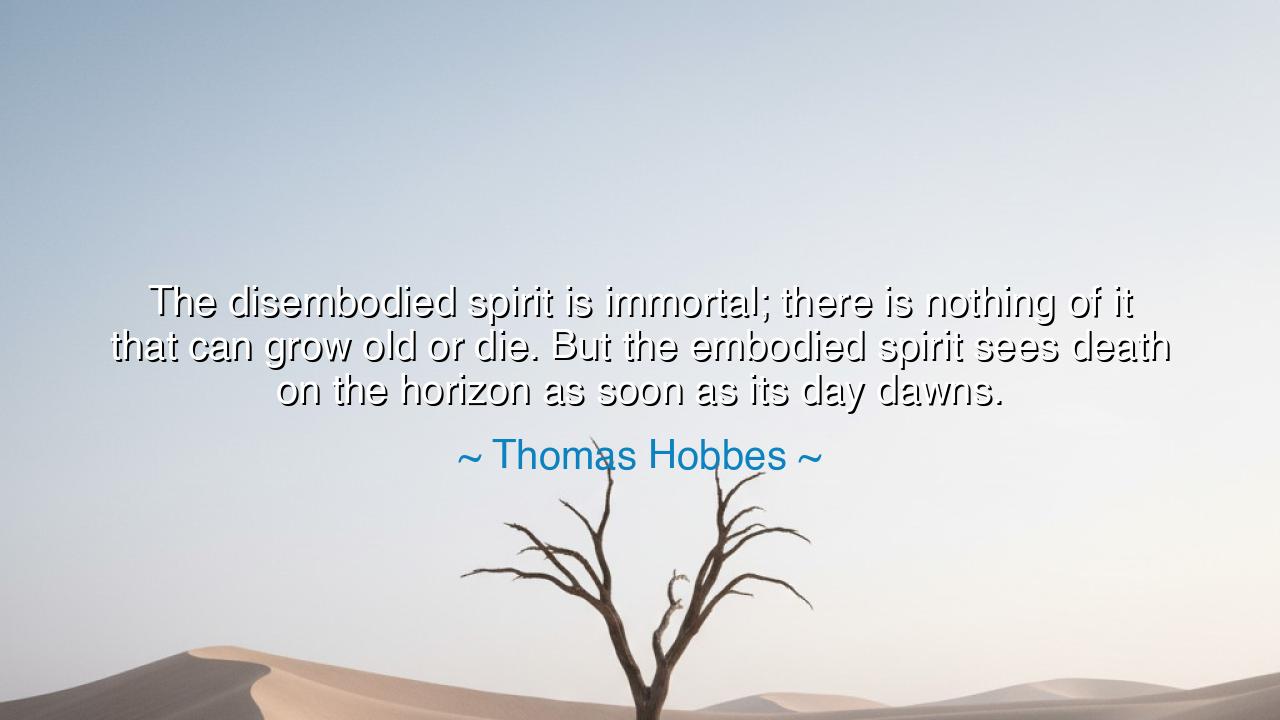
The disembodied spirit is immortal; there is nothing of it that
The disembodied spirit is immortal; there is nothing of it that can grow old or die. But the embodied spirit sees death on the horizon as soon as its day dawns.






When Thomas Hobbes wrote, “The disembodied spirit is immortal; there is nothing of it that can grow old or die. But the embodied spirit sees death on the horizon as soon as its day dawns,” he spoke as a philosopher gazing into the twin mysteries of life and mortality. In these words, he drew a sacred contrast between the eternal soul and the mortal body — between what is bound by time and what belongs to eternity. To Hobbes, the spirit, when free of flesh, is infinite and unchanging, untouched by decay or sorrow. Yet the moment that same spirit is clothed in flesh, it becomes aware of limitation, of fragility, of the ever-approaching shadow of death. Thus, from the instant of birth, mortality is our companion, walking beside us until we return to the realm of the unseen.
In the ancient world, philosophers wrestled with the same paradox: that man is both divine and dust. The body is the vessel through which the spirit acts and feels, yet it is also the source of suffering and decline. The Greeks taught that the soul longs to return to the heavens, to escape the prison of the body. Hobbes, though rooted in the age of reason, echoed this ancient longing. The disembodied spirit, he said, is untouched by the passing of years; it neither ages nor dies, for it exists beyond matter and time. But the embodied spirit, having entered the physical world, must live under the law of nature — where all that begins must end. To live in flesh is to awaken to impermanence; to feel the warmth of the sun is also to know that night must come.
This vision, though somber, is not despairing — it is clarifying. Hobbes reminds us that to be human is to walk the border between the eternal and the finite. The immortal soul within us whispers of infinity, while the mortal body teaches humility. Every wrinkle, every pain, every fading year is a reminder of our temporary station. Yet the awareness of death can also be the birth of wisdom. For when a man sees death on the horizon, he learns to cherish each sunrise, to weigh his days not by their number but by their depth. Those who deny death live shallowly, but those who look upon it with clear eyes discover the art of living fully before the end.
Consider the story of Marcus Aurelius, the philosopher-emperor of Rome. Surrounded by power, he nevertheless wrote daily meditations on the fleeting nature of life. “You could leave life right now,” he reminded himself, “let that determine what you do and say and think.” Like Hobbes, he saw that the embodied spirit — no matter how noble — carries death within its horizon. Yet instead of fearing it, he used it as a compass. Death, he believed, strips away illusion and vanity, revealing what is real and enduring. It is not the enemy of life, but its teacher. And so he ruled wisely, calmly, aware that while his body would perish, the spirit of virtue and reason within him belonged to eternity.
Hobbes’s words also carry a hidden mystery of balance. The spirit and the body are not enemies, but companions in the grand journey of existence. The body gives the spirit a voice in the world — the hands to build, the eyes to see, the heart to love. Yet it is also the spirit’s duty to guide the body toward meaning, to remind it that life’s purpose is not survival alone, but understanding, creation, and compassion. The embodied spirit may see death as inevitable, but it also has the power to fill its mortal days with immortal acts: truth spoken, kindness given, beauty created. In these, the eternal shines through the perishable.
The meaning of this quote, then, is both humbling and exalting. It teaches that our fleshly existence is temporary, yet not futile. For even though the body decays, every noble thought and selfless deed is a spark of the immortal spirit expressing itself in time. Death waits for all who are born, yet the spirit — the essence of consciousness, love, and truth — remains untouched. This is why wise men across the ages have said that death is not the end, but a return — a return from the visible to the invisible, from the shadow to the light.
So take this lesson, child of both earth and heaven: honor your body, but do not mistake it for your whole being. Live well within its bounds, for it is the brief dwelling of your spirit. Do not flee from the thought of death, for it is the truest mirror of life. Let it remind you to love deeply, to act justly, to create boldly, and to leave behind something worthy of the eternal. For though the embodied spirit sees death at every horizon, the disembodied spirit — your truest self — will never perish. And when the last day dawns and the horizon closes, you shall not end, but awaken into the light from which you first came.






AAdministratorAdministrator
Welcome, honored guests. Please leave a comment, we will respond soon